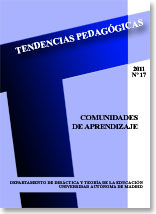MOTIVATIONS AND BARRIERS TO THE TRANSFORMATION OF AN EDUCATIONAL CENTER IN LEARNING COMMUNITY
Keywords:
Learning communities, transformation, qualitative methodology, innovation factors, barriers.Copyright (c) 2015 Tendencias Pedagógicas

This work is licensed under a Creative Commons Attribution-NonCommercial 4.0 International License.
Abstract
This article reports the study carried out in a public nursery school which starts its transformation into a learning community. Several factors were used to determine teachers’ motivations to initiate and develop the project. It is performed on a sample of 15 teachers, through content analysis of 15 interviews focused on the project. The perceived relevance, the consistency with the project and the perceived working knowledge, proved to be motivating factors. The same relative consistency, the project need of adjustment, the perceived difficulties and the lack of expectations of success in implementation, appeared as barriers to transformation.Downloads
References
Abrami, Ph.C., Poulsen, C. y Chambers, B. (2004). Teacher Motivation to Implement an Educational Innovation: Factors differentiating users and
non-users of cooperative learning. Educational Psychology, 24(2), 201-216.
Aguado, L.(2005). Psicología y Educación. Madrid: Alianza Editorial. Aubert, A., Flecha, A., García Yeste, C., Flecha, R. y Racionero, S. (2008).
Aprendizaje Dialógico en la Sociedad de La Información. Barcelona: Editorial Hipatia.
Bazarra Rodríguez, L., Casanova, O. y García Ugarte, J. (2004). Ser profesor y dirigir profesores en tiempos de cambio. Madrid: Editorial Narcea.
Bruner, J.S. (1988) Desarrollo cognitivo y educación. Madrid: Morata.
Domingo Segovia, J. (2005). El asesoramiento al centro educativo. Colaboración y cambio en la institución. Barcelona: Ediciones Octaedro
Elboj, C., Puigdellivol, I., Soler, M. y Valls, R. (2002). Comunidades de Aprendizaje. Transformar la educación. Barcelona: Graó.
Day, Ch. (2006). Pasión por enseñar. La identidad personal y profesional del docente y sus valores. Madrid: Editorial Narcea.
Flecha, R. (1997). Compartiendo palabras. Barcelona: Paidós.
Freire, P. (1975). Pedagogía del oprimido. Madrid: Siglo XXI
Fullan, M. (2002). Las fuerzas del Cambio. Explorando las profundidades de la Reforma Educativa. Madrid: Editorial Akal
Fullan, M. (2004). Las fuerzas del cambio. La continuación. Madrid: Editorial Akal
Gomez, J., Latorre, A., Sanchez, M. y Flecha, R. (2006). Metodología comunicativa crítica. Barcelona: El Roure.
Habermas, J. (2001). Teoría de la Acción Comunicativa. Volumen I: racionalidad de la acción y racionalidad social. Madrid: Taurus. Ministerio de Educación. Gobierno de España (2010) PISA 2009 Programa para la Evaluación Internacional de los Alumnos OCDE informe español
http://www.educacion.es/dctm/ministerio/horizontales/prensa/notas/2010/20101207-Pérez Gómez, A. (2009).¿ Competencias o pensamiento práctico? La
construcción de los significados de representación y de acción. En J. Gimeno Sacristán (coord) Educar por competencias, ¿qué hay de nuevo? (págs. 59-102) Madrid: Editorial Morata.
Pozo Municio, J.I. (2006). Nuevas formas de pensar la enseñanza y el aprendizaje: las concepciones del profesorado y los alumnos. Barcelona: Editorial Graó.
Racionero Plaza, S. (2010). Egalitarian dialogue and instrumental dimension. Two principles of dialogic learning in the classroom. Psychology, Society,
& Education, 2(1), 61-70
Rivas Navarro, M. (2000). Innovación Educativa: Teoría, Procesos y Estrategias. Madrid: Editorial Síntesis.
Rodríguez Gómez, G., Gil Flores, J. y García Jiménez, E. (1996). Metodología de La Investigación Cualitativa. Archidona (Málaga): Ediciones Aljibe.
Rogoff, B. (1993). Aprendices del pensamiento. El desarrollo cognitivo en el contexto social. Barcelona: Ediciones Paidós.
Ruiz Olabuenaga, J. I. (1989). La descodificación de la vida cotidiana métodos de investigación cualitativa. Bilbao: Editorial Deusto.
Sánchez Aroca, M. (1999). Voices Inside Schools - La Verneda-Sant Martí: A School Where People Dare to Dream. Harvard Educational Review. (69)3, 320 - 336
Tójar Hurtado, Juan Carlos. (2006). Investigación cualitativa comprender y actuar. Madrid: Editorial La Muralla.
Valls Caroll,R. (2000). Comunidades de Aprendizaje como práctica educativa de Aprendizaje Dialógico para la Sociedad de la Información. Tesis Doctoral. Universidad de Barcelona.
Wells, G. (2001). Indagación dialógica. Hacia una teoría y una práctica socioculturales de la educación. Barcelona: Paidós.
Vygotsky, L.S. (1995). Pensamiento y lenguaje. Barcelona: Paidós (v.o.1934)
